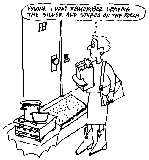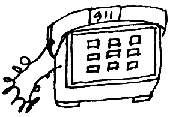
Play it Safe
YOUR EYES, EARS, AND COMMON SENSE ARE YOUR BEST WEAPONS AGAINST CRIME

YOUR EYES, EARS, AND COMMON SENSE ARE YOUR BEST WEAPONS AGAINST CRIME
by Stephanie Mann with M.C. Blakeman
There are many things you can do to prevent crime or deal with a criminal attack. These tips will help you avoid danger, whether you're sitting in your living room, walking in the neighborhood or driving home. It all falls under the domain of "street smart": Be alert, remain aware of your surroundings and trust your instincts.
PERSONAL SAFETY AT HOME
The best way to stay safe at home is to keep criminals out of it. In addition to having strong home security measures, to physically deter intruders, you want to be able to identify and circumvent the ploys criminals might use to try to enter your home. Much of the advice about staying safe at home may sound obvious, but don't overlook it‹a little bit of common sense can go a long way in preventing crime.
Don't Open Your Door to a Stranger
No one intentionally puts out a welcome mat to a criminal, yet unsuspecting victims open their doors to intruders all the time, often without even thinking to ask, "Who's there?"
 The simplest way to protect yourself at the front door is to observe the person on the other side before opening the door‹preferably without being seen yourself. Ideally you would do this through a peephole. If you do not know the person, you can either ignore him altogether or speak through the door (or intercom), to find out who he is and what he wants.
The simplest way to protect yourself at the front door is to observe the person on the other side before opening the door‹preferably without being seen yourself. Ideally you would do this through a peephole. If you do not know the person, you can either ignore him altogether or speak through the door (or intercom), to find out who he is and what he wants.
 Trust your instincts. You do not have to be overly paranoid, but if you are at all suspicious, do not open the door. As long as your door is closed, you have a relative degree of safety. Once you open it, however, anything can happen. And do not rely on a door chain to protect you if you plan on partially opening the door. These chains are notoriously ineffective and easy to break if someone wants to enter your house.
Trust your instincts. You do not have to be overly paranoid, but if you are at all suspicious, do not open the door. As long as your door is closed, you have a relative degree of safety. Once you open it, however, anything can happen. And do not rely on a door chain to protect you if you plan on partially opening the door. These chains are notoriously ineffective and easy to break if someone wants to enter your house.

 Here's how to handle different types of people at your door.
Here's how to handle different types of people at your door.
Emergency calls. Suppose two people came to your door saying they just had a terrible accident and need to use your phone right away. What would you do? Stop first, and think. You are home alone and something does not feel right about the situation. Trust your instincts. Do not let the couple in. Instead, offer to call the emergency number so they can return to the scene and wait for help to arrive. Some con artists have been known to use the emergency ruse to get into homes and commit robberies.
Fundraisers and solicitors. If a person comes to your door asking for money for a cause or wanting to sell you a product, and you're not interested in the cause or product, simply say so. If you are interested, either ask them to show identification first, before you open the door, or request that they leave literature for you to read. You could also ask the person to return later; specify a time when you know you will not be alone.
Repairs, deliveries, and collections. Unless you are expecting them, ask repairpeople and others who claim to have business with you to hold up their identification cards for you to see through a peephole or door window. If you have the slightest doubt of their authenticity, telephone their business office (get the number from the phone book or from information) to verify whether the house call is legitimate. Do the same with individuals making deliveries or taking collections. If someone claims to be collecting for your newspaper subscription, and it is not the usual person, do not open your door. Instead, call the newspaper office and let them know you will be mailing in a check, or wait until your regular delivery person is back on the job.
 Do not leave repair people alone in your home unless you know them well. And if you have any suspicions about them, do not stay in the house alone with them.
Do not leave repair people alone in your home unless you know them well. And if you have any suspicions about them, do not stay in the house alone with them.
Don't Let Intruders Fool You On the Phone
A person who is intent on stealing your property would prefer to do it when you are not there. To reduce the odds of getting caught, a burglar may phone first to see if anyone is home. He may get your name from the mailbox, or from the cute sign with the family moniker above the door. Or he could simply look up your name in the phone book. If he gets no answer, he may decide it's a good time to break into your house.
 Because criminals can be very adroit at extracting information, it's important that you treat a stranger on the phone the same as if that person came to your door.
Because criminals can be very adroit at extracting information, it's important that you treat a stranger on the phone the same as if that person came to your door.
 Here are some suggestions:
Here are some suggestions:
Watch what you say. Warn family members not to give information to strangers over the phone about who is home, who is out, or how long anyone is expected to be gone. Do not continue talking to a person who refuses to identify himself. Nor should you get into a conversation with a survey-taker or anyone else who wants your name, address, marital status or other information that would reveal you are alone, or that you are vulnerable because of a broken leg or other disability.
Code names. If you are bothered by frequent calls from strangers, you might set up a code name to be used by friends and family members.
 Example: A group of teenagers pestered an older woman by pretending to be her grandson Jason. The grandmother notified the phone company to see if they could trace the calls, and then she and her grandson worked out a signal. Jason would ask for "Hank" whenever he called. That way, the grandmother knew it was her grandson and not the other kids.
Example: A group of teenagers pestered an older woman by pretending to be her grandson Jason. The grandmother notified the phone company to see if they could trace the calls, and then she and her grandson worked out a signal. Jason would ask for "Hank" whenever he called. That way, the grandmother knew it was her grandson and not the other kids.
Obscene callers and other unusual calls. Hang up on obscene callers immediately. Do not cry or show that you are upset or afraid. If you do not react and simply hang up, most of the time they will not call back. If the caller continues to harass you, consider keeping a loud whistle next to your phone. The next time the person calls, blow the whistle as loudly as possible into the mouthpiece. But remember to move the receiver's ear piece away from your ear when you blow the whistle, so that you do not hurt your own eardrums.
PERSONAL SAFETY ON NEIGHBORHOOD STREETS
Getting Home Safely
When you have almost arrived home, or are just outside your door, it's natural to let your guard down. A criminal could take advantage of you in such moments. To protect yourself, stay alert and practice these safety habits until they become routine.
Have your key ready to slip into the keyhole. If your head is down and you are fumbling for your keys at the bottom of your purse, or in your briefcase or coat pockets, you are less likely to notice a suspicious person. Motion sensitive lights that go on when you approach your doorway are a good idea. You may also want to keep a small flashlight on your key ring to help you find keys and keyholes in the dark.
Stay alert at your doorway so that a potential intruder cannot push in behind you as you enter your home. If someone approaches you as you are walking toward your door, be careful. If you're at all suspicious of that person, don't go inside. Instead, go to a neighbor's house. And if you have to call for help, you have a much better chance of being heard if you are outside.
Do not overburden yourself with packages and groceries that block your view and restrict your movements. If you are unloading your car, it's better to make a few trips than to try to carry everything at once. City dwellers who do most of their errands on foot may want to invest in a small cart for carting groceries or laundry home. Should a mugger or robber appear, you could always push the cart away and run-or push the cart at him and take off.
If you arrive at your door and something does not appear as it should-for example, a door or window is open when you're quite certain you closed it-do not enter the house. Even if there is no visible sign that something is amiss but you sense someone might be inside, trust your intuition and do not go in. Instead, quickly go to a neighbor's house or to the nearest telephone and call the police.
 The good news for older adults is that violent crimes against them have dropped dramatically in the past two decades. One government study, the National Criminal Victimization Survey, found that the crime rate against elderly citizens dropped 61 percent from 1974 to 1990. The bad news is that an older person can suffer greater bodily harm if they are attacked, so they should take special care to follow the safety precautions suggested here.
The good news for older adults is that violent crimes against them have dropped dramatically in the past two decades. One government study, the National Criminal Victimization Survey, found that the crime rate against elderly citizens dropped 61 percent from 1974 to 1990. The bad news is that an older person can suffer greater bodily harm if they are attacked, so they should take special care to follow the safety precautions suggested here.
From Safe Homes, Safe Neighborhoods: Stopping Crime Where You Live, by Stephanie Mann with M.C. Blakeman. Illustrations by Linda Allison and Terri Hearsh. © 1993 by Stephanie Mann and M.C. Blakeman. Excerpted by arrangement with Nolo Press. $14.95. Available in local bookstores, or call 800-992-6656.




